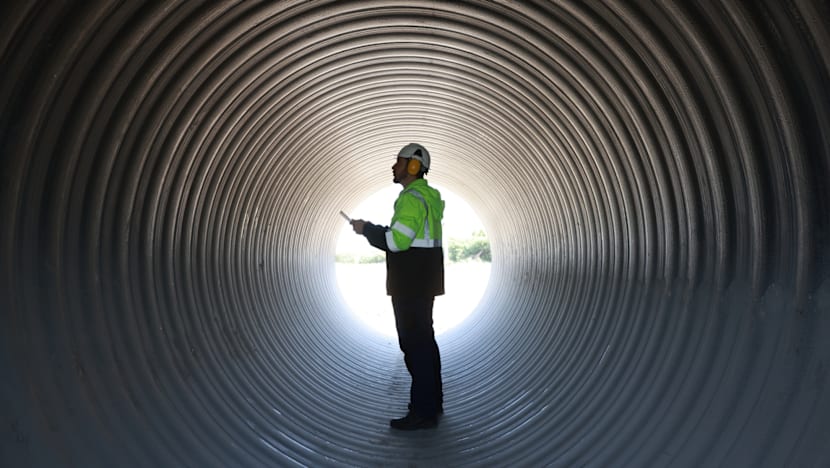Low pay, mismatched expectations: Why Singapore students are turning away from engineering
Falling enrolment in traditional engineering courses has raised concerns among engineering leaders, who warn that the talent drain could hurt Singapore’s ability to develop and maintain infrastructure.

More engineering graduates are choosing to pursue a different career. (File photo: iStock)

This audio is generated by an AI tool.
SINGAPORE: As a child, Mark made model planes using cardboard rolls from kitchen paper. He read books about aircraft and dreamed of becoming a pilot. So when it came time to pick a degree, aerospace engineering was the obvious choice.
Now 24 and in his final year at Nanyang Technological University (NTU), Mark – who asked to remain anonymous – is looking for an exit.
“For me, straight up, the number one, and actually the only thing that would come to mind is just starting pay,” he said.
Mark is not alone in considering leaving traditional engineering for the prospect of a better-paying career path.
Industry experts told CNA that traditional engineering fields – which include aerospace, civil, mechanical, electrical and chemical engineering – have struggled to attract and retain talent.
This struggle has been especially noticeable over the past decade as industries such as finance and technology have become more popular.
“They actually took our best students to join them … So that has become quite a norm today,” said Mr Chuck Kho, president of the Association of Consulting Engineers Singapore (ACES).
He noted a pattern of early-career engineers crossing into other industries after a few years on the job.
This talent drain has raised concerns among engineering leaders, who warn that a lack of homegrown engineers could hurt Singapore’s ability to develop and maintain infrastructure.
“The consequences of not having enough engineers will be catastrophic for the future generation,” said Mr Chew Tai Chong, Asia-Pacific managing director at built environment consultancy Arup, who has over 40 years of engineering experience.
“Who is going to look after your ageing asset, who is going to actually help you to renew and improve in 50 years' time, if you don't have an engineer to do that?”
DECLINE IN INTEREST FROM STUDENTS
Figures from the Ministry of Education show the decline in interest over two decades. In 2003, 42.9 per cent of university students were enrolled in engineering sciences. By 2023, this had dropped to 22.2 per cent.
Polytechnic enrolment followed a similar trend, falling from 43.3 per cent in 2003 to 27.9 per cent in 2023.
At Temasek Polytechnic, while interest in areas such as aerospace and biomedical engineering remains steady, courses like mechanical and electrical engineering have seen slower take-up, said Mr Chang Hark Loong, its School of Engineering’s deputy director of academic programmes and outreach.
At the same time, entry into such courses has become less competitive. In 2010, the 10th percentile of A-level students admitted to NTU’s aerospace engineering course had at least three As and one B.
The latest indicative grades show four Cs at the same percentile, although it should be noted that universities now take more holistic approaches in considering aptitude-based admissions.
Many engineering graduates also end up choosing a different career path.
Mr Chan Ewe Jin, president of the Institution of Engineers Singapore, said that factors such as long working hours and a lack of public appreciation for the complexity of engineering work deter young professionals.
On top of this, he said, remuneration often does not match the time and effort needed to progress in the profession.
“Unlike some other professions, an engineering career develops through mentoring, structured training and considerable hands-on experience, which naturally takes time to acquire,” he said.
For Mark, learning that his internship company paid below-average starting salaries to entry-level engineers was a turning point.
“The whole financial aspect of being an engineer in Singapore is anything but attractive,” he said.
Based on the latest graduate employment survey, fresh graduates in traditional engineering disciplines at NUS, NTU and SIT earned median gross monthly salaries of S$4,000 to S$5,500 (US$2,930 to US$4,030). The data takes into account graduates who have already left the industry.
Others are put off by a disconnect between what they learnt at school and the realities of the job.
John, a 24-year-old mechanical engineering graduate now working in consulting, said he lost interest just a year into his course.
“I was expecting it to be a lot more practical, a lot more hands-on, and I was also hoping to learn things that were more at the frontier of industry,” he said.
Much of the material that was taught, he added, seemed to be “recycled” from years ago and not applicable to the real world.
Kevin, an aerospace engineering student, is considering moving into finance.
“It's not that there's a lack of roles. It's just that the roles … are more to do with MRO (maintenance, repair and overhaul),” he said.
EFFORTS TO IMPROVE PROSPECTS
The authorities have recognised the need to attract and retain talent.
For the civil engineering sector, a task force for architectural and engineering consultants has made 11 recommendations, including internships with higher starting salaries and dedicated mentors.
It also suggested changes to procurement practices to help firms invest more in talent.
Industry experts and students welcomed the proposals and expressed hope that similar measures would be applied across engineering fields.
Fourth-year NTU student Rohan Govindharajalu said around 40 per cent of his mechanical engineering peers are undecided about entering the field after graduation.
“Imagine if the companies just offer S$200 or S$300 more, then the pay difference might just be very little … And if their passion for engineering is good enough, they might choose to go into engineering instead of going into a bank,” said Mr Govindharajalu, who is among those who hope to pursue engineering after graduation.
Mr Kho of ACES said implementation will take time. “Surely this cannot be done overnight, right? It will take a lot of continuous effort, sustained effort over a few years at least, to see the change.”
REBRANDING ENGINEERING
More also needs to be done to change how students view engineering early on, said president of the Society of Women Engineers, Ms Ng Pei Fern.
While outreach programmes reveal student interest, many hesitate to pursue engineering courses because it’s “hard to score”, she said.
“We lose some talents even at that early stage, which I find is a pity,” she said.
She added that misconceptions persist about the nature of the work.
“A lot of people just somehow feel that engineering is for nerds, like you're sitting in front of the PC alone day after day, trying to do things alone,” she said. “It's not like that.”
Mr Kho said the built environment sector suffers from public perceptions that equate it with visible work like construction sites.
“But of course, engineering work is a lot more than that. So because of our quiet working behind the scenes, people don't really notice us,” he said, adding that ACES is stepping up efforts to rebrand the profession.
IES’ Mr Chan said that greater engagement by practitioners could help spark interest.
“When engineers explain the real-life impact and excitement of their work, it helps students see engineering beyond textbooks,” he said.
And while interest in traditional engineering courses may have waned, Institutes of Higher Learning have seen growing demand for hybrid disciplines such as AI and data engineering, robotics and mechatronics.
Dr Graham Ng, director of Nanyang Polytechnic’s School of Engineering, said students are increasingly drawn to hybrid engineering courses that integrate digital and interdisciplinary skills.
“This reflects a broader shift in student preferences and industry expectations, with course curriculum now infusing sustainability, digitalisation and emerging technologies,” he said.
Similarly, a spokesperson from the Singapore Institute of Technology said that while interest in their engineering programmes have remained “robust overall”, the school has seen interest across programmes shift over time in response to industry trends and emerging technologies.
As such, SIT reviews and refreshes its curriculum regularly, the spokesperson said.
NTU's associate provost for undergraduate education, Professor Gan Chee Lip, acknowledged that intakes for mechanical and aerospace engineering have seen slower growth over the last few years, owing to "a shift in interest towards high-growth areas in the technology sector such as in computing and artificial intelligence, and a slowdown in the aviation industry during the pandemic".
But he noted that enrolment for civil engineering has remained steady in the past decade, and said electrical and electronic engineering remains a popular choice due to a global shift towards sustainable energy and demand for skilled tech professionals.
Overall, there has been a slight increase in NTU’s engineering intake over the past decade, said Prof Gan.
CNA has also contacted other institutes of higher learning for comment.
THE NEED FOR TALENT RENEWAL
To make up for the shortage of local engineers, Singapore continues to rely on foreign professionals.
According to MOM’s 2024 report on job vacancies, roles such as civil, industrial and production engineers were among the top 10 PMET vacancies.
Still, experts say that Singapore must rebuild a strong local base.
In the late 1900s, there was a big push to recruit engineers – “the best of the crop”, said Mr Kho. Now, with many of those engineers retiring, the need for talent renewal is urgent.
“Who is taking it over? Who wants to be in that position to create the next generation of new things?” said Arup’s Mr Chew.
There needs to be a broader mindset shift, he added.
“It’s not just about making money. It's about our contribution towards humanity and towards our future generation.”

















